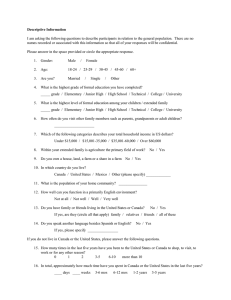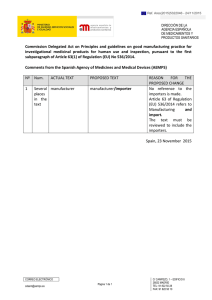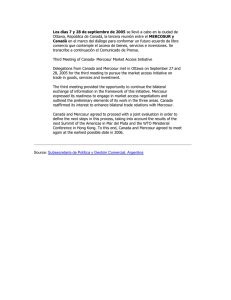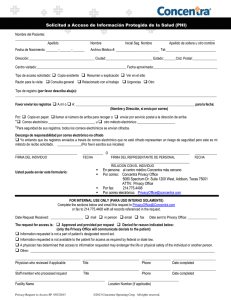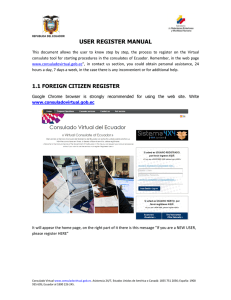Semillas de mostaza, partidas o no PA 2103.30 – Harina de mostaza
Anuncio
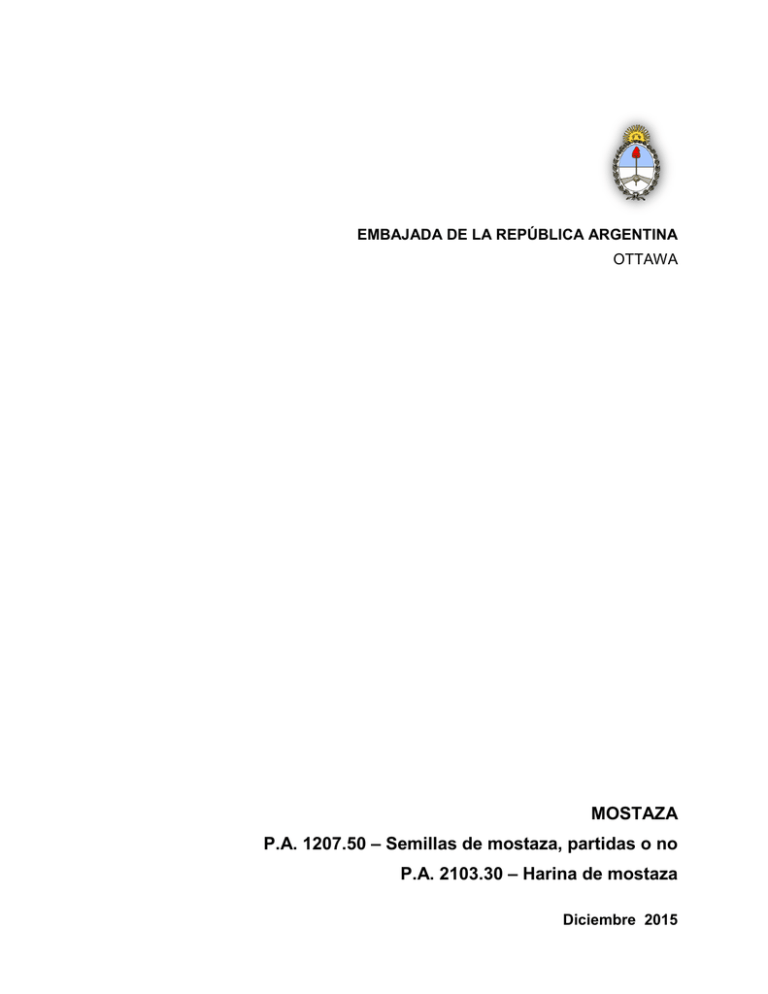
EMBAJADA DE LA REPÚBLICA ARGENTINA OTTAWA MOSTAZA P.A. 1207.50 – Semillas de mostaza, partidas o no P.A. 2103.30 – Harina de mostaza Diciembre 2015 El presente informe abarca las siguientes temáticas: 1. Introducción 2. Tratamiento arancelario 3. Requisitos de importación y fitosanitarios 4. Organismos intervinientes 5. Estadísticas de importación 6. Normas de etiquetado 7. Canales de comercialización y precios de referencia 8. Listado de importadores MOSTAZA 1 – INTRODUCCIÓN - Industria de la semilla de mostaza en Canadá La semilla de mostaza (Brassica spp.) es un cultivo de temporada fresca, anual, que se puede cultivar durante una corta temporada, comúnmente en rotación con cereales de grano pequeño. Siendo un pariente de canola, la semilla de mostaza tiene la ventaja de ser más tolerante a la sequía, el calor, y las heladas. Canadá produce tres tipos de mostaza: amarilla (Sinapis alba), marrones y oriental (Brassica juncea). Hasta la fecha, Agriculture and Agri-Food Canada (AAFC) ha llevado a cabo la mayoría de las investigaciones acerca del grano de mostaza en Canadá. Sin embargo, recientemente, la industria ha acordado el cobro de una tasa para apoyar proyectos de investigación. A lo largo de los últimos diez años, las estaciones de investigación en el oeste de Canadá han lanzado constantemente variedades mejoradas de este cultivo. Actualmente, las variedades de mostaza oriental y amarilla tienen características que son específicas de los distintos segmentos del mercado. Los objetivos actuales de reproducción incluyen el desarrollo de cultivos mejorados de todas las variedades de mostaza y una serie de mejoras en cuanto a calidad, incluyendo una mejor adaptación a los suelos semiáridos, y el aumento de rendimiento, así como en aceite y proteínas. Algunas variedades con bajo contenido de aceite también se han desarrollado para los propósitos de molienda en seco. Recientemente, AAFC desarrolló una nueva planta de mostaza con calidad canola que podría ser cultivada en las regiones más secas del oeste de Canadá. - Valor nutricional Las semillas de mostaza (amarilla) contienen 20 a 30% de proteínas, 24 a 35% de aceite, 6 a 12% de lípidos y 12 a 18% de carbohidratos. El aceite de mostaza contiene 93% isotiocianato de alilo, que ayuda contra el crecimiento de mohos, levaduras, listeria, E. coli y varios otros patógenos de los alimentos - Productos y aplicaciones La semilla de mostaza se utiliza principalmente en las industrias de condimentos y alimentos, en forma de semillas o aceite. También se utiliza como emulsionante, y para el control de la textura en muchos productos (el salvado de la mostaza amarilla contiene aproximadamente 25% de arabinogalactano, una sustancia mucilaginosa). El grano de mostaza amarilla, el más suave de los tres tipos, es adecuado para una amplia gama de aplicaciones, incluyendo la molienda seca para harina, la molienda en húmedo, para pastas de mostaza, y las semillas enteras, para mezclas de especias, procesamiento de carne y otros productos alimenticios. El contenido de aceite de la semilla de mostaza amarilla es la más baja de los tres tipos de mostaza, situándose en aproximadamente 27%. La mostaza marrón y la semilla de mostaza oriental son picantes. La semilla de mostaza marrón se procesa en forma de harina que se utiliza para producir mostaza picante que se emplea en productos europeos. El contenido de aceite en la mostaza marrón es de alrededor del 36%. El grano de mostaza oriental se utiliza a menudo para producir aceites de cocina picantes. Hay variedades de semillas de mostaza oriental cultivadas en Canadá que tienen contenidos de aceite de hasta 50%, aunque el contenido medio de aceite es de aproximadamente el 39%. Más información se puede obtener en el siguiente enlace: http://www.agr.gc.ca/eng/industry-markets-and-trade/statistics-and-market-information/byproduct-sector/crops/crops-market-information-canadian-industry/canada-outlook-for-principalfield-crops/?id=1378743094676 Fuente: Agriculture and Agri – Food Canada 2 – TRATAMIENTO ARANCELARIO A continuación se puede observar el tratamiento arancelario que Canadá le otorga a la posición arancelaria 1207.50.90 – Semillas de mostaza, partidas o no: A continuación se puede observar el tratamiento arancelario que Canadá le otorga a la posición arancelaria 2103.30.10 – Harina de mostaza: 3 - REQUISITOS DE INGRESO - Requisitos de los Productos Alimenticios en Canadá Todos los productos alimenticios están reglamentados por el Sistema de Regulación de Canadá para Alimentos con beneficios para la salud. La Ley de Alimentos y Drogas (Food and Drugs Act) es la legislación básica que regula la seguridad y la calidad nutricional de los alimentos que se venden en Canadá. La Ley y su Reglamento establecen las condiciones sobre: - el etiquetado, la publicidad y los reclamos de los alimentos - las normas y los requisitos de composición de los alimentos - fortificación - alimentos para regímenes especiales - aditivos alimentarios - seguridad química y microbiana - medicamentos veterinarios - material de embalaje - pesticidas El papel de la ley y el reglamento es proteger al público contra los riesgos para la salud y el fraude con relación a la venta de alimentos y bebidas, medicamentos, productos naturales para la salud, dispositivos médicos y cosméticos. En el siguiente link, correspondiente a la Canadian Food Inspection Agency, en su Automated Import Reference System (AIRS), se puede acceder a la información requerida por Canadá para la importación del producto en cuestión: http://airs-sari.inspection.gc.ca/airs_external/english/decisions-eng.aspx Para obtener la información, se debe colocar en la ventana superior la posición arancelaria del producto y presionar el botón “Search”. En el listado que se muestra abajo, seleccionar el producto de interés presionando el botón “View”, a la derecha de cada producto. En la ventana titulada “Select by Drill-down”, seleccionar el producto correspondiente y presionar el botón “Go”. Continuar con el mismo procedimiento hasta obtener la información requerida. A continuación se transcribe, como referencia, el informe que emite la Canadian Food Inspection Agency en su Automated Import Reference System (AIRS) para los productos solicitados. Se recomienda verificar los datos que abajo se muestran. - H.S. 1207.50 – 1207.50 - Mustard seeds (whether or not broken) Summary of requirements Import Details for Requirement : 31244 Version : 1 HS Description : 120750 12 - Oil seeds and oleaginous fruits; miscellaneous grains, seeds and fruit; industrial or medicinal plants; straw and fodder 07 - Other oil seeds and oleaginous fruits, whether or not broken 50Mustard seeds OGD Extension : 710100 7101 - Sinapis sp. (Mustard), seed Origin: AR SA - South America (includes Central America) AR - Argentina End Use: 05 05 - Propagation (growing or sowing) Miscellaneous: 370 370 - Other than small "lots" / Non-authorized importer Recommendations to CBSA/Documentation and Registration Requirements Refer to CFIA-NISC(must be accompanied by the following documents\registrations): Import declaration Seed Analysis Certificate Importer / Broker Instructions Documentation Instructions SEED ANALYSIS CERTIFICATE Obtain from: 1) an officially recognized laboratory in Canada 2) a laboratory operated under the supervision of a Registered Seed Technologist in the USA 3) a laboratory operated by or under the authority of a national or state government of a foreign country IMPORT DECLARATION - SEED: Obtain from our web site: www.inspection.gc.ca/english/for/mpppe.shtml. The declaration must contain the following information: - the name of the kind or species of seed; - the quantity of seed; - the variety name of the seed for all kinds, species and varieties subject to registration pursuant to Part III, other than common seed of forage crops; - the lot designation of the seed; - the name and address of the exporter; - the name and address of the importer; - the country where the crop from which the seed is derived was grown; - the telephone number of the importer; and, - the intended purposes of the imported seed. CONDITIONS OF IMPORT Seed must be of a registered variety if the seed is to be sold for commercial production in Canada. Please refer to our website, www.inspection.gc.ca, or contact the nearest Import Service Centre for further information. Seed for propagation imported for research purposes is exempt from variety registration requirements only. A seed lot may consist of one or more packages. ADDITIONAL INSTRUCTIONS Seed lots of > 500 g are not considered "small lots". *** Please note that border lookouts and targets take precedence over import requirements indicated in AIRS. - Any import inspection services provided by CFIA staff are subject to a CFIA user fee. - May be subject to requirements of Other Government Departments (federal, provincial, territorial or municipal). - Contact an Import Service Centre for further information. Submissions of 'Request for Documentation Review' form (CFIA/ACIA 5272): **Please note that there are specific instructions depending on method of declaration: -Paper Declaration: 'Request for Documentation Review' form (CFIA/ACIA 5272) must be completed when providing a faxed package to the NISC. -Other Government Department (OGD) Pre-arrival Review System (PARS) / Release on Minimum Documentation (RMD) Declaration: 'Request for Documentation Review' form (CFIA/ACIA 5272) must be completed when providing a faxed package to the NISC. -Integrated Import Declaration (IID): 'Request for Documentation Review' form (CFIA/ACIA 5272) is only to be provided as part of the declaration if required by AIRS, under the Documentation and Registration Requirements section of AIRS. *** GUIDELINES TO FOLLOW WHEN SUBMITTING A FAXED PACKAGE TO NISC: *** -Do not use company fax cover page -Use the 'Request for Documentation Review' form (CFIA/ACIA 5272) as the first document of a fax submission -Ensure the new version of the 'Request for Documentation Review' form (CFIA/ACIA 5272) is used -Ensure all information on the 'Request for Documentation Review' form (CFIA/ACIA 5272) is typed -Do not provide a bar code and/or a label transaction code on the 'Request for Documentation Review' form (CFIA/ACIA 5272) -Ensure to key in the transaction number on the 'Request for Documentation Review' form (CFIA/ACIA 5272) -Do not affix any labels or stickers to the 'Request for Documentation Review' form (CFIA/ACIA 5272) -Should a single fax contain multiple requests ensure the 'Request for Documentation Review' form (CFIA/ACIA 5272) separates each request. WOOD PACKAGING MATERIAL (for all origins except continental United States) Brokers/ Importers must attest to one of the following with respect to the packaging material being used to ship the product: - "Wood packaging contained with shipment displays the ISPM No. 15 compliant stamp." OR - " Wood packaging material is accompanied by a Phytosanitary Certificate ie: approved treatment per ISPM no. 15. " (Please note that phytosanitary certificates are not accepted for wood packaging materials originating from China) OR - "Wood packaging material is made out of manufactured wood which is exempted from ISPM No. 15." OR (when it applies) - "No wood packaging contained with shipment." PLANTS WITH NOVEL TRAITS/GENETICALLY MODIFIED PLANTS: When importing plants or viable plant material, importers should be aware that if the imported product is a plant with a novel trait (PNT), it may be subject to additional regulatory requirements. PNTs are plants into which a trait(s) has been intentionally introduced that is new to plants of the same species cultivated in Canada and has the potential to affect the specific use and safety of the plant with respect to the environment and human health. PNTs are a broad category of plants that can be produced through a variety of methods, including genetic engineering. For example, a plant may be considered a PNT if it has been modified to display a new trait resulting in increased weediness or invasiveness potential. Please refer to Directive 96-13 for additional information and regulatory requirements. Please note that PNTs/genetically modified plants that have been authorized for unconfined release* into the Canadian environment by the CFIA are not subject to any additional import requirements beyond those applicable to their conventional counterparts. * Unconfined Release of PNTs The Plant Biosafety Office of the Canadian Food Inspection Agency is responsible for the regulation of plants with novel traits (PNTs) in Canada in regards to environmental safety. Before a PNT can be authorized for unconfined environmental release, a determination on the risk to the environment, including to human health, is required. More information on environmental safety assessment can be found at : http://www.inspection.gc.ca/english/plaveg/bio/uncone.shtml INSTRUCTIONS FOR CBSA D-19 - Seeds : Included in This Section: · Any seeds intended for propagation or imported for further processing for propagation, including flowers, fruit and vegetables, and cereal grains such as wheat, oats, and barley. Excluded From This Section: ·Seeds and grains imported for human consumption or animal feed. The requirements for these products are listed under "Grains, Seeds, and Nuts for Human Consumption" and "Animal Feed" respectively. Applicable Legislation ·Seeds Act and Regulations ·Plant Protection Act and Regulations Note to customs: All Import Declaration forms must be forwarded to CFIA following release. Exemptions "Small Lots" are defined as follows: ·5 kg or less of the following species – wheat, oats, barley, rye, triticale, sorghum, corn, and seeds of similar sizes. ·500 g or less of the following species – grass seed, forages, flower seed, millet, and seeds of similar sizes. Commercial importations ·The Canadian Wheat Board Act includes provisions for the use of unlimited quantity Special Import Licence (SPL 13) to cover the importation of barley seed to be used exclusively for plant research by specified individuals through agreement under the Seeds Act and regulations. Non-commercial importations ·Importers of "small lots" of seeds are exempt from the Seed Analysis Certificate and Seed Import Declaration requirements. These shipments may be released by the Canada Border Services Agency if no other requirements are listed. Notes ·There are no exemptions to the Canadian Food Inspection Agency's (CFIA) requirements outlined in this section, and all importations will be referred to the CFIA for release. · A seed lot may consist of one or more packages. · Seed screenings and seed for cleaning – Seed screenings are regulated and should be referred to CFIA – Barley, millet, oats, rye, triticale, and wheat seeds being imported only for cleaning are also regulated and should be referred to CFIA. Additional References ABCs of Seed Importation into Canada Please refer to http://www.inspection.gc.ca/english/plaveg/seesem/abce.shtml to view the document "ABCs of Seed Importation into Canada". D-96-13 Import Permit Requirements for Plants with Novel Traits (Including Transgenic Plants), and Their Products Please refer to our website http://www.inspection.gc.ca/english/plaveg/protect/dir/d-9613e.shtml to view the text. Plant Protection Act and Regulations To view the Plant Protection Act and Regulations, please refer to our website http://www.inspection.gc.ca/english/reg/rege.shtml or contact the nearest Import Service Centre for further information. Seeds Act and Regulations To view the Seeds Act and Regulations, please refer to our website http://www.inspection.gc.ca/english/reg/rege.shtml or contact the nearest Import Service Centre for further information. Small Lots of seeds "Small Lots" are defined as follows: - 5 kg or less of the following species - wheat, oats, barley, rye, tritcale, sorghum, corn, and seeds of similar sizes. - 500 g or less of the following species - grass seed, forages, flower seed, millet, and seeds of similar sizes. - H.S. 2103.30 - Mustard Flour and Meal and Prepared Mustard Summary of Requirements Import Details for Requirement : 23902 Version : 4 HS Description: 210330 21 - Miscellaneous edible preparations 03 - Sauces and preparations thereof; mixed condiments and mixed seasonings; mustard flour and meal and prepared mustard 30 - Mustard flour and meal and prepared mustard OGD Extension: 211200 2112 - Mustard flour and meal End Use: 08 08 - Human consumption Recommendations to CBSA/Documentation and Registration Requirements Approved Importer / Broker Instructions CONDITIONS OF IMPORT Use "human consumption" end use if any portion of the imported commodity is intended for human consumption or use in a food product (including ingredients and/or additives) and sale. The Food and Drugs Act defines "sale" as including "offer for sale", "expose for sale", "have in possession for sale" and "distribute", whether or not the distribution is made for consideration. GENERAL CONDITION FOR ALL IMPORTED PRODUCTS INTENDED FOR SALE IN CANADA THAT ARE UNDER THE JURISDICTION OF THE IMPORTED & MANUFACTURED FOOD PROGRAM (IMFP) Importers are responsible for ensuring that the products they import for sale into Canada comply with the requirements of all applicable Canadian legislation including the Food and Drugs Act and Regulations, and the Consumer Packaging and Labelling Act and Regulations, as they relate to food. SPECIFIC CONSIDERATIONS FOR THIS PARTICULAR PRODUCT NOTE: The following information highlights specific requirement(s)/condition(s) applicable to this particular product. The following information should not be interpreted as complete. Importers must ensure that they comply with the “General Condition” outlined above. Where applicable, importers should consult the appropriate Division of the Food and Drug Regulations for the compositional standard and other applicable requirements for this product. Refer to Division 7 of the Food and Drug Regulations for the standards and other applicable requirements for spices, dressings and seasonings. Importers should consult all applicable reference documents for information on standards and guidelines related to food safety and labelling including those provided below. See the "Additional References" section for the links to these documents. • Good Importing Practices for Food • Food Labelling for Industry • Standards and Guidelines for Microbiological Safety of Food - An Interpretive Summary • Canadian Standards ("Maximum Levels") for Various Chemical Contaminants in Foods • List of Maximum Residue Limits Regulated Under the Pest Control Products Act • Guidelines for the General Cleanliness of Food Attention - EDI/ACROSS clients - To ensure auto approval of this commodity by the CFIA, you must press "EDI" to obtain the codes necessary to complete your electronic release transmission. Failure to submit these codes will result in a "machine reject" message from the CFIA. ADDITIONAL INSTRUCTIONS *** Please note that border lookouts and targets take precedence over import requirements indicated in AIRS. - Any import inspection services provided by CFIA staff are subject to a CFIA user fee. - May be subject to requirements of Other Government Departments (federal, provincial, territorial or municipal). - Contact an Import Service Centre for further information. Submissions of 'Request for Documentation Review' form (CFIA/ACIA 5272): **Please note that there are specific instructions depending on method of declaration: -Paper Declaration: 'Request for Documentation Review' form (CFIA/ACIA 5272) must be completed when providing a faxed package to the NISC. -Other Government Department (OGD) Pre-arrival Review System (PARS) / Release on Minimum Documentation (RMD) Declaration: 'Request for Documentation Review' form (CFIA/ACIA 5272) must be completed when providing a faxed package to the NISC. -Integrated Import Declaration (IID): 'Request for Documentation Review' form (CFIA/ACIA 5272) is only to be provided as part of the declaration if required by AIRS, under the Documentation and Registration Requirements section of AIRS. *** GUIDELINES TO FOLLOW WHEN SUBMITTING A FAXED PACKAGE TO NISC: *** -Do not use company fax cover page -Use the 'Request for Documentation Review' form (CFIA/ACIA 5272) as the first document of a fax submission -Ensure the new version of the 'Request for Documentation Review' form (CFIA/ACIA 5272) is used -Ensure all information on the 'Request for Documentation Review' form (CFIA/ACIA 5272) is typed -Do not provide a bar code and/or a label transaction code on the 'Request for Documentation Review' form (CFIA/ACIA 5272) -Ensure to key in the transaction number on the 'Request for Documentation Review' form (CFIA/ACIA 5272) -Do not affix any labels or stickers to the 'Request for Documentation Review' form (CFIA/ACIA 5272) -Should a single fax contain multiple requests ensure the 'Request for Documentation Review' form (CFIA/ACIA 5272) separates each request. WOOD PACKAGING MATERIAL (for all origins except continental United States) Brokers/ Importers must attest to one of the following with respect to the packaging material being used to ship the product: - "Wood packaging contained with shipment displays the ISPM No. 15 compliant stamp." OR - " Wood packaging material is accompanied by a Phytosanitary Certificate ie: approved treatment per ISPM no. 15. " (Please note that phytosanitary certificates are not accepted for wood packaging materials originating from China) OR - "Wood packaging material is made out of manufactured wood which is exempted from ISPM No. 15." OR (when it applies) - "No wood packaging contained with shipment." INSTRUCTIONS FOR CBSA D-19 - Processed Fruits and Vegetables and Maple Products : Included in This Section: ·Any food product prepared wholly or in part from fruits or vegetables including frozen, concentrated, marinated, preserved and canned products. Does not include fresh chilled product. ·Maple product ·In this section, products may come by all type of container: canned food, glass jar, plastic jar, plastic pouch, Tetra-Pack and non-sealed packaging. Excluded in this Section : ·Honey and bee products for bee feeding, refer to section "Products of Animal Origin". Applicable Legislation ·Canada Agricultural Products Act ·Processed Products Regulations ·Maple Products Regulations ·Consumer Packaging and Labelling Act and Regulations ·Food and Drugs Act and Regulations ·May be subject to provincial regulations. Note to customs: All Import Declaration forms must be relayed to a CFIA Import Service Centre following release of shipments. Exemptions ·Importations of processed fruits and vegetables and maple product are exempted from the declaration requirement of the Processed Products Regulations and Maple Product Regulations when: a) they are consigned to a national or international exhibition when ; 1) the food product weighs 100 kg or less; and 2) they are not intended for sale in Canada. b) they are consigned for use and human consumption of the importer et not for resale or distribution when : 1) their weight does not exceed 20 kg for processed fruits & vegetables, 100L for maple sirup and 25kg for other maple product. 2) they are part of an immigrant's effect 3) In the case of maple product, they are carried by vessel, train, motor vehicule, aircraft or any transportation for food passengers or crew members. 4) they are imported from the United States onto the Akwesasne Reserve for use by an Akwesasne resident. This does not apply to a food product that is shipped to Canada from another country through the United States. 5) In the case of Processed Fruits & Vegetables, if they are the object of marketing test. Ministerial exemption ·The Minister of Agriculture and Agri-Food Canada or a delegate of the Minister of the Canadian Food Inspection Agency may exempt certain importations from any of the regulated requirements if these importations are for the purpose of marketing a food product. However, the exemption can only be granted if the Minister or delegate considers an importation necessary in order to alleviate a shortage in Canada in the available supply from domestic production of that food product or any equivalent product. The shipment may be subject to inspection or analysis when arriving to Canada. Additional References Consumer Packaging and Labelling Act and Regulations To view the Consumer Packaging and Labelling Act and Regulations, please refer to our website http://www.inspection.gc.ca/english/reg/rege.shtml or contact the nearest Import Service Centre for further information. Food and Drugs Act and Regulations To view the Food and Drugs Act and Regulations, please refer to our website: http://www.inspection.gc.ca/english/reg/rege.shtml or contact the nearest Service Centre for further information. Food and Drugs Act and Regulations - Spices Regulated by sections B.07 of the Food and Drugs Act and Regulations. 4 – ORGANISMOS INTERVINIENTES ASOCIACIONES Canadian Special Crops Association 1215 - 220 Portage Avenue Winnipeg, Manitoba R3C 0A5, Canada Email:[email protected] Tel.: 204-925-3780 / 204-925-3783 Fax: 204-925-3785 Saskatchewan Mustard Development Commission Bay 6A - 3602 Taylor Street East Saskatoon, Saskatchewan S7H 5H9, Canada E-mail:[email protected] Telephone: 306-975-6629 / 306-975-6620 (Executive Director) Fax: 306-244-4497 Executive Director: Kevin Hursh INSTITUCIONES RELACIONADAS CANADIAN GRAIN COMMISSION 900-303 Main Street Winnipeg MB R3C 3G8, Canadá Tel.: (204) 983-3305 Fax: (204) 983-7550 Sitio Web: https://www.grainscanada.gc.ca/index-eng.htm Correo electrónico: [email protected] Contacto: Brian Lemon, Director de Servicios de la Industria GRAIN CANADA 6665 Henri Bourassa West Montréal, QC H4R 1E1, Canadá Tel.: (514) 483-0807 Fax: (514) 483-3753 Sitio Web: http://www.grain-canada.com/ Correo electrónico: [email protected] PULSE CANADA 1212-220 Portage Avenue Winnipeg, Manitoba R3C 0A5, Canadá Tel.: (204) 925-4455 Fax: (204) 925-4454 Sitio Web: http://www.pulsecanada.com Correo electrónico: [email protected] CSCA – CANADIAN SPECIAL CROPS ASSOCIATION 1215 – 220 Portage Avenue Winnipeg, MB R3C 0A5, Canadá Tel.: (204) 925-3780 Fax: (204) 925-4454 Sitio Web: http://www.specialcrops.mb.ca/ CANADIAN INTERNATIONAL GRAINS INSTITUTE 1000-303 Main Street Winnipeg, MB R3C 3G7, Canadá Tel.: (204) 983-5344 Fax: (204) 983-2642 Sitio Web: http://www.cigi.ca Correo electrónico: [email protected] Contacto: JoAnne Buth, Presidente (204) 983-4980 [email protected] ENLACES Mustards in Alberta Alberta Agriculture, Food and Rural Development Mustard in Saskatchewan Saskatchewan Agriculture and Food Mustard in Manitoba Manitoba Agriculture, Food and Rural Initiatives 5 – ESTADÍSTICAS 1207.50 – Semillas de mostaza, partidas o no Importaciones 1207.50 - Mustard seeds (whether or not broken) Principales 10 países desde donde Canadá importó el producto Últimos 5 años Valores en U$D 2010 Estados Unidos 2011 2012 2013 2014 239,738 181,351 359,335 915,810 1,097,099 Líbano 12,762 10,514 23,659 39,148 125,396 India 38,628 42,669 67,807 71,847 52,134 126,061 38,925 38,989 45,079 39,971 9,205 10,766 10,942 24,260 28,424 Chile 1 -- 59,402 32,762 20,490 Israel -- 4 -- -- 5,046 Japón 218 6 1,104 690 1,781 China 21 2,672 7,308 5,543 1,308 Paquistán 24 175 -- 348 741 426,658 287,082 568,546 1,135,487 1,372,390 61,370 28,779 15,047 2,043 828 488,028 315,861 583,593 1,137,530 1,373,218 Reimportaciones Francia Subtotal Otros Total países Fuente: Industry Canada En la tabla se puede observar que al año 2014, el principal país desde donde Canadá importó semillas de mostaza fue Estados Unidos, haciéndolo por un valor de U$D 1,09 millones. En segundo lugar, Canadá importó este producto desde Líbano, por un monto de U$D 125.396; en lugar se encuentra, como destino de importación a India, desde donde Canadá importó semillas de mostaza por un valor de U$D 52.134. La Argentina no comercializó el producto en el período relevado. 2103.30 – Harina de mostaza Importaciones 2103.30 - Mustard Flour and Meal and Prepared Mustard Principales 10 países desde donde Canadá importó el producto Últimos 5 años Valores en U$D 2010 2011 2012 2013 2014 Estados Unidos 16,299,158 16,531,967 17,750,892 16,012,590 17,662,239 Francia 8,176,136 9,008,269 9,716,190 9,317,452 9,590,256 224,713 191,625 176,633 242,968 210,608 Reino Unido 37,496 58,669 96,931 96,629 144,001 Polonia 83,461 80,413 61,272 72,300 66,144 Holanda 23,809 23,825 22,165 24,028 35,193 China 51,876 29,556 47,258 20,508 33,838 Japón 34,792 57,620 25,760 49,880 32,624 8,790 9,944 4,925 14,207 19,367 23,235 10,260 9,531 19,593 14,846 24,963,466 26,002,148 27,911,557 25,870,155 27,809,116 183,931 321,135 232,543 297,066 135,120 25,147,397 26,323,283 28,144,100 26,167,221 27,944,236 Alemania India Reimportaciones (Canadá) Subtotal Otros Total países Fuente: Industry Canada Se puede observar que al año 2014, el principal país desde donde Canadá importó harina de mostaza fue Estados Unidos, desde donde lo hizo por un monto de U$D 17,6 millones. En segundo lugar, Canadá importó el producto desde Francia, por un valor de U$D 9,5 millones; el tercer país desde donde importó harina de mostaza fue Alemania, haciéndolo por un monto de U$D 210.608. Argentina ocupó el puesto 28° en esta tabla, vendiendo este producto a Canadá, al año 2014, por un valor de U$D 1.786, lo que representa un descenso con respecto a 2013, cuando lo hizo por un monto de U$S 1.860. 6 - NORMAS DE ETIQUETADO El Ministerio de Salud de Canadá (Health Canada) es responsable, en virtud de la Ley de Alimentos y Medicamentos (FDA), para el establecimiento de políticas y normas relativas a la salud, la seguridad y la calidad nutricional de los alimentos que se venden en Canadá. La Agencia de Inspección Alimentaria de Canadá (CFIA) es responsable de la administración de las políticas de etiquetado de alimentos, de problemas relacionados con la falsificación y el fraude en el etiquetado de alimentos, envasado y publicidad (FDA), y de las disposiciones generales de etiquetado sobre los productos agroalimentarios y pescados respecto al grado, calidad y composición especificadas en la Ley de Canadá Productos Agropecuarios (CAPA), la Ley de Inspección de Carnes (MIA) y la Ley de inspección Pesquera (FIA). Además, la CFIA es responsable de la administración de las disposiciones relacionadas con la alimentación de los materiales de empaque del Consumidor y la Ley de Etiquetado (CPLA), incluyendo información básica sobre la etiqueta en los alimentos, la cantidad neta, sistema métrico y etiquetado bilingüe. Más información puede obtenerse en el siguiente enlace: http://www.inspection.gc.ca/food/labelling/eng/1299879892810/1299879939872 La CFIA es responsable de la aplicación de todos los requisitos mencionados anteriormente. En el siguiente enlace se puede ver en detalle las normas de etiquetado exigidas por Canadá: http://inspection.gc.ca/food/labelling/food-labelling-for-industry/labelling-requirementschecklist/eng/1393275252175/1393275314581 7 – CANALES DE COMERCIALIZACIÓN Y PRECIOS DE REFERENCIA En la tabla a continuación, se pueden observar los precios de referencia, expresados en dólares canadienses (CAD). PRECIOS DE REFERENCIA COMERCIO PRODUCTO Orgánica – Semilla entera – marrón - 16 oz (453 g) Natural - Semilla entera – dorada - 16 oz (453 g) I HERB http://ca.iherb.com/ WALMART http://www.walmart.ca/ PRECIO (en CAD) $ 7,47 $ 7,00 Orgánica – molida 1,80 oz (51 g) $ 4,73 Natural – molida 1,76 oz (49 g) $ 4,65 Orgánica – molida – dorada 16 oz (453 g) $ 10,08 Mostaza en Polvo 130 g $ 1,50 GATHERING PLACE TRADING Semillas – doradas COMPANY 40 g http://www.gatheringplacetrading.com/ $ 4,00 Semillas – doradas, enteras (bolsa) 95 g $ 4,99 Semillas – doradas, enteras (bolsa) 190 g $ 8,99 Semillas – marrón, enteras (bolsa) 90 g $ 4,99 Semillas – marrón, enteras (bolsa) 180 g $ 8,99 Semillas – negras, enteras (bolsa) 90 g $ 4,99 Semillas – negras, enteras (bolsa) 180 g $ 8,99 THE SILK ROAD SPICE http://www.silkroadspices.ca/ 8 - LISTADO DE IMPORTADORES IMPORTADORES CANADIENSES DE SEMILLAS DE MOSTAZA (INCLUSO QUEBRANTADAS) 1207.50 – Mustard Seeds (Whether Or Not Broken) ALL COMMODITIES (AC) TRADING LTD. 1600 Two Mile Road Winnipeg, MB R2N 4K1, Canadá Tel.: (204) 339-8001 Fax: (204) 339-8002 Sitio Web: http://www.allcommodities.ca/ Correo electrónico: [email protected] Contacto: Kevin Dick, Presidente ALTIUS SPICES AND SEASONINGS INC. 19000 TransCanada Highway Baie-d’Urfé, QC H8X 3S4, Canadá Tel.:(514) 457-2200 Sitio Web: http://www.altiusspice.com Correo electrónico: [email protected] ARZ BAKERY LIMITED 1909 Lawrence Avenue East Scarborough, ON M1R 2Y6, Canadá Tel.: (416) 755-5084 Sitio Web: http://www.arzfinefoods.com/ Correo electrónico: [email protected] BESCO GRAIN LTD. P. O. Box 166 Brunkild, MB R0G 030, Canadá Tel.: (204) 736-3570 Fax: (204) 736-3575 Sitio Web: http://bescograin.ca/ Correo electrónico: http://bescograin.ca/contact-us/ LA MAISON ORPHEE INC. 905, av. Galiléee Québec, QC G1P 4G4, Canadá Tel.: (418) 681-1530 Sitio Web: https://www.maisonorphee.com/ Correo electrónico: [email protected] SAKAI SPICE (CANADA) CORPORATION 4201 – 2nd Avenue N. Lethbridge, AB T1H 0C8, Canadá Tel.: (403) 320-9445 Fax: (403) 320-9446 Sitio Web: http://www.sakaispice.com Correo electrónico: [email protected] Contacto: Steve McDonnell, Gerente General AGT FOODS 6200 E. Primrose Green Drive Regina, SK, Canadá Tel.: (306) 525-4490 Fax; (306) 525-4463 Sitio Web: http://www.agtfoods.com/ VITERRA INC. 2625 Victoria Avenue Regina, SK S4T 7T9, Canadá Tel.: (305) 569-4411 Fax: (305) 569-4708 Correo electrónico: [email protected] IMPORTADORES CANADIENSES DE HARINA DE MOSTAZA 2103.30 – Mustard Flour And Meal and Prepared Mustard GEODIS WILSON CANADA LTD. 3061 Orlando Drive Mississaiga.ON L4V 1R4, Canadá Tel.: (905) 677-5266 Fax: (905) 677-5819 Sitio Web: http://www.geodiswilson.com Correo electrónico: [email protected] Contacto: Brian Rusak, CA, Presidente Tel.: (905) 678-5550 [email protected] LES ALIMENTS WHYTE’S INC./WHYTE’S FOODS INC. 1540 rue des Patriotes Sainte-Rose Laval, QC H7L 2N6, Canadá Tel.: (450) 625-1976 Sitio Web: http://whytes.ca/ Correo electrónico: [email protected] LOBLAWS INC. 1 President’s Choice Circle Brampton, ON L6Y 5S5, Canadá Tel.: (855) 416-1244 Fax: (905) 861-2387 Sitio Web: http://www.loblaw.ca/ Correo electrónico: [email protected] RECKITT BENCKISER (CANADA) INC. 1680 Tech Avenue, Unit 2 Mississauga, ON L4W 5S9, Canadá Tel.: (905) 283-7000 Fax: (905) 283-7001 Sitio Web. http://www.rb.com Contacto: Caroline Hey, Gerente General
